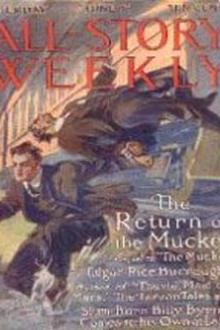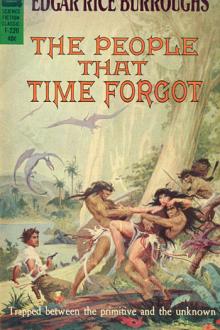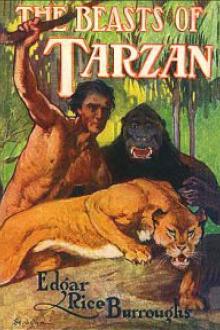The Return of the Mucker, Edgar Rice Burroughs [best affordable ebook reader txt] 📗

- Author: Edgar Rice Burroughs
- Performer: -
Book online «The Return of the Mucker, Edgar Rice Burroughs [best affordable ebook reader txt] 📗». Author Edgar Rice Burroughs
So far no one had seen Billy since he had passed from the ken of the trussed deputy sheriff, and as Billy had no desire to be seen he slipped over the edge of the embankment into a dry ditch, where he squatted upon his haunches waiting for the train to depart. The stop out there in the dark night was one of those mysterious stops which trains are prone to make, unexplained and doubtless unexplainable by any other than a higher intelligence which directs the movements of men and rolling stock. There was no town, and not even a switch light. Presently two staccato blasts broke from the engine’s whistle, there was a progressive jerking at coupling pins, which started up at the big locomotive and ran rapidly down the length of the train, there was the squeaking of brake shoes against wheels, and the train moved slowly forward again upon its long journey toward the coast, gaining momentum moment by moment until finally the way-car rolled rapidly past the hidden fugitive and the freight rumbled away to be swallowed up in the darkness.
When it had gone Billy rose and climbed back upon the track, along which he plodded in the wake of the departing train. Somewhere a road would presently cut across the track, and along the road there would be farmhouses or a village where food and drink might be found.
Billy was penniless, yet he had no doubt but that he should eat when he had discovered food. He was thinking of this as he walked briskly toward the west, and what he thought of induced a doubt in his mind as to whether it was, after all, going to be so easy to steal food.
“Shaw!” he exclaimed, half aloud, “she wouldn’t think it wrong for a guy to swipe a little grub when he was starvin’. It ain’t like I was goin’ to stick a guy up for his roll. Sure she wouldn’t see nothin’ wrong for me to get something to eat. I ain’t got no money. They took it all away from me, an’ I got a right to live—but, somehow, I hate to do it. I wisht there was some other way. Gee, but she’s made a sissy out o’ me! Funny how a feller can change. Why I almost like bein’ a sissy,” and Billy Byrne grinned at the almost inconceivable idea.
Before Billy came to a road he saw a light down in a little depression at one side of the track. It was not such a light as a lamp shining beyond a window makes. It rose and fell, winking and flaring close to the ground.
It looked much like a camp fire, and as Billy drew nearer he saw that such it was, and he heard a voice, too. Billy approached more carefully. He must be careful always to see before being seen. The little fire burned upon the bank of a stream which the track bridged upon a concrete arch.
Billy dropped once more from the right of way, and climbed a fence into a thin wood. Through this he approached the camp fire with small chance of being observed. As he neared it the voice resolved itself into articulate words, and presently Billy leaned against a tree close behind the speaker and listened.
There was but a single figure beside the small fire—that of a man squatting upon his haunches roasting something above the flames. At one edge of the fire was an empty tin can from which steam arose, and an aroma that was now and again wafted to Billy’s nostrils.
Coffee! My, how good it smelled. Billy’s mouth watered. But the voice—that interested Billy almost as much as the preparations for the coming meal.
We’ll dance a merry saraband from here to drowsy Samarcand. Along the sea, across the land, the birds are flying South, And you, my sweet Penelope, out there somewhere you wait for me, With buds, of roses in your hair and kisses on your mouth.
The words took hold of Billy somewhere and made him forget his hunger. Like a sweet incense which induces pleasant daydreams they were wafted in upon him through the rich, mellow voice of the solitary camper, and the lilt of the meter entered his blood.
But the voice. It was the voice of such as Billy Byrne always had loathed and ridiculed until he had sat at the feet of Barbara Harding and learned many things, including love. It was the voice of culture and refinement. Billy strained his eyes through the darkness to have a closer look at the man. The light of the camp fire fell upon frayed and bagging clothes, and upon the back of a head covered by a shapeless, and disreputable soft hat.
Obviously the man was a hobo. The coffee boiling in a discarded tin can would have been proof positive of this without other evidence; but there seemed plenty more. Yes, the man was a hobo. Billy continued to stand listening.
The mountains are all hid in mist, the valley is like amethyst, The poplar leaves they turn and twist, oh, silver, silver green! Out there somewhere along the sea a ship is waiting patiently, While up the beach the bubbles slip with white afloat between.
“Gee!” thought Billy Byrne; “but that’s great stuff. I wonder where he gets it. It makes me want to hike until I find that place he’s singin’ about.”
Billy’s thoughts were interrupted by a sound in the wood to one side of him. As he turned his eyes in the direction of the slight noise which had attracted him he saw two men step quietly out and cross toward the man at the camp fire.
These, too, were evidently hobos. Doubtless pals of the poetical one. The latter did not hear them until they were directly behind him. Then he turned slowly and rose as they halted beside his fire.
“Evenin’, bo,” said one of the newcomers.
“Good evening, gentlemen,” replied the camper, “welcome to my humble home. Have you dined?”
“Naw,” replied the first speaker, “we ain’t; but we’re goin’ to. Now can the chatter an’ duck. There ain’t enough fer one here, let alone three. Beat it!” and the man, who was big and burly, assumed a menacing attitude and took a truculent step nearer the solitary camper.
The latter was short and slender. The larger man looked as though he might have eaten him at a single mouthful; but the camper did not flinch.
“You pain me,” he said. “You induce within me a severe and highly localized pain, and furthermore I don’t like your whiskers.”
With which apparently irrelevant remark he seized the matted beard of the larger tramp and struck the fellow a quick, sharp blow in the face. Instantly the fellow’s companion was upon him; but the camper retained his death grip upon the beard of the now yelling bully and continued to rain blow after blow upon head and face.
Billy Byrne was an interested spectator. He enjoyed a good fight as he enjoyed little else; but presently when the first tramp succeeded in tangling his legs about the legs of his chastiser and dragging him to the ground, and the second tramp seized a heavy stick and ran forward to dash the man’s brains out, Billy thought it time to interfere.
Stepping forward he called aloud as he came: “Cut it out, boes! You can’t pull off any rough stuff like that with this here sweet singer. Can it! Can it!” as the second tramp raised his stick to strike the now prostrate camper.
As he spoke Billy Byrne broke into a run, and as the stick fell he reached the man’s side and swung a blow to the tramp’s jaw that sent the fellow spinning backward to the river’s brim, where he tottered drunkenly for a moment and then plunged backward into the shallow water.
Then Billy seized the other attacker by the shoulder and dragged him to his feet.
“Do you want some, too, you big stiff?” he inquired.
The man spluttered and tried to break away, striking at Billy as he did so; but a sudden punch, such a punch as Billy Byrne had once handed the surprised Harlem Hurricane, removed from the mind of the tramp the last vestige of any thought he might have harbored to do the newcomer bodily injury, and with it removed all else from the man’s mind, temporarily.
As the fellow slumped, unconscious, to the ground, the camper rose to his feet.
“Some wallop you have concealed in your sleeve, my friend,” he said; “place it there!” and he extended a slender, shapely hand.
Billy took it and shook it.
“It don’t get under the ribs like those verses of yours, though, bo,” he returned.
“It seems to have insinuated itself beneath this guy’s thick skull,” replied the poetical one, “and it’s a cinch my verses, nor any other would ever get there.”
The tramp who had plumbed the depths of the creek’s foot of water and two feet of soft mud was crawling ashore.
“Whadda YOU want now?” inquired Billy Byrne. “A piece o’ soap?”
“I’ll get youse yet,” spluttered the moist one through his watery whiskers.
“Ferget it,” admonished Billy, “an’ hit the trail.” He pointed toward the railroad right of way. “An’ you, too, John L,” he added turning to the other victim of his artistic execution, who was now sitting up. “Hike!”
Mumbling and growling the two unwashed shuffled away, and were presently lost to view along the vanishing track.
The solitary camper had returned to his culinary effort, as unruffled and unconcerned, apparently, as though naught had occurred to disturb his peaceful solitude.
“Sit down,” he said after a moment, looking up at Billy, “and have a bite to eat with me. Take that leather easy chair. The Louis Quatorze is too small and spindle-legged for comfort.” He waved his hand invitingly toward the sward beside the fire.
For a moment he was entirely absorbed in the roasting fowl impaled upon a sharp stick which he held in his right hand. Then he presently broke again into verse.
Around the world and back again; we saw it all. The mist and rain
In England and the hot old plain from Needles to Berdoo. We kept a-rambling all the time. I rustled grub, he rustled rhyme— Blind-baggage, hoof it, ride or climb—we always put it through.
“You’re a good sort,” he broke off, suddenly. “There ain’t many boes that would have done as much for a fellow.”
“It was two against one,” replied Billy, “an’ I don’t like them odds. Besides I like your poetry. Where d’ye get it— make it up?”
“Lord, no,” laughed the other. “If I could do that I wouldn’t be pan-handling. A guy by the name of Henry Herbert Knibbs did them. Great, ain’t they?”
“They sure is. They get me right where I live,” and then, after a pause; “sure you got enough fer two, bo?”
“I have enough for you, old top,” replied the host, “even if I only had half as much as I have. Here, take first crack at the ambrosia. Sorry I have but a single cup; but James has broken the others. James is very careless. Sometimes I almost feel that I shall have to let him go.”
“Who’s James?” asked Billy.
“James?





Comments (0)